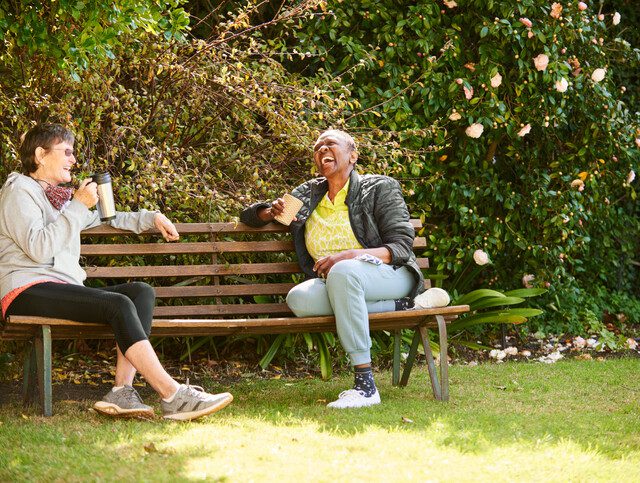As we age, occasional forgetfulness isn’t uncommon. In fact, incremental changes in memory can begin as early as your 20s. It’s also not uncommon to start to worry about your brain health at the first sign of a memory blip. And while it’s true that symptoms of Alzheimer’s disease and dementia can start to show up in your 60s, simply misplacing your keys is not necessarily a cause for alarm.
Providing the keys to successful aging is one of our top priorities at Harbour’s Edge. That’s why we want to take the time to ensure our residents and the greater community are equipped with the information they need about when to act on memory issues as well as habits to adopt now to support a healthy brain.
Signs & Symptoms of Alzheimer’s
There are more than 6 million Americans living with Alzheimer’s. If you or someone you love has been impacted by this disease, you understand just how devastating it can be. While there is currently no cure for Alzheimer’s, there are some known risk factors you can try to avoid.
Know Your Alzheimer’s Risk
Some risk factors like age, family history, and genetics can’t be changed, but others, like behavioral and lifestyle factors, we have more control over. Smoking is one of the biggest risk factors for Alzheimer’s. Other habits like a sedentary lifestyle, poor diet, or excessive alcohol consumption also heighten your risk.
Health conditions like high blood pressure, high cholesterol, and diabetes can also play a role.
Know The Signs of Alzheimer’s
If you’re concerned that your memory issues or those of a loved one might be more than just forgetfulness, consult with a medical professional. The Alzheimer’s Association offers these 10 signs that might indicate a more serious memory issue:
- Memory loss that disrupts daily life
- Challenges in planning or solving problems
- Difficulty completing familiar tasks
- Confusion with time or place
- Trouble understanding visual images or spatial relationships
- New problems with words in speaking or writing
- Misplacing things and losing the ability to retrace steps
- Decreased or poor judgment
- Withdrawal from work or social activities
- Changes in mood and personality
Ways to Boost Brain Health
The Alzheimer’s Association recommends staying physically, mentally, and socially active for optimal brain health. If you aren’t currently engaging your brain in these ways, the good news is it’s fairly easy to start incorporating simple habits into your routine. And if you’re already doing many of the things that help boost brain health, consider this a reminder to keep it up!
Physical Activities
It’s no surprise that physical activity is an important part of staying healthy. It has many benefits, including cardiovascular health and increasing blood flow to the brain. A healthy heart is a healthy brain!
- Quit smoking! Smoking is one of the major risk factors for cognitive decline. It impacts both the nervous and vascular systems, and effects on those can speed up memory loss.
- Be active. Incorporating physical activity into your daily routine not only provides a boost of feel-good endorphins and an opportunity to socialize or even get outside, but it can help keep your brain healthy too.
- Enjoy a healthy diet. Diets like the DASH and Mediterranean diets, which are low in saturated fats and feature fruits, vegetables, whole grains, fish, and poultry, may help lower the risk for dementia.
Mental Activities
Taking care of your body includes taking care of your brain. Finding opportunities to challenge your mind is equally as important as opportunities to relax the mind.
- Get adequate sleep. Conditions like insomnia or sleep apnea disrupt restorative sleep and may lead to memory issues.
- Challenge yourself. Whether it’s signing up for a new class, picking up a hobby or solving puzzles, engaging the brain in this way has both short- and long-term benefits.
- Reduce stress. Stress can take a toll on our mental health and acuity. Whether through prayer, meditation, yoga, tai-chi, or journaling, quiet opportunities for reflection and focused breathing can help reduce stress.
Social Activities
Staying active socially provides a host of benefits for both the mind and the soul.
- Volunteer. Whether you choose to get involved with a community group or advocate for a cause that is near and dear to your heart, feeling that you’re making a difference and have a greater purpose has been linked to reduced signs of dementia.
- Join a club. Pursue your passions with others who share the same interests and forge new friendships over common ground. Bridge club, golf club, book club, wine club — the options are endless!
- Visit with friends and family. Catching up with loved ones over coffee or enjoying the company of your neighbors at dinner provides an opportunity for laughter, connection, support, and love.
How Harbour’s Edge Supports Brain Health
Finding opportunities for physical, mental, and social activities is easy at Harbour’s Edge. Our independent-living residents are active, worldly, and inspiring. Exploring the Pineapple Arts District, working out with friends in our fitness center, or enjoying a whiskey tasting in our cocktail lounge are a regular part of life here. The happiness and well-being of our residents are at the core of everything we do.
If you’re ready to experience the benefits of luxury senior living on Florida’s Intracoastal Waterway, fill out the form below or contact us here. We’d love to talk!


